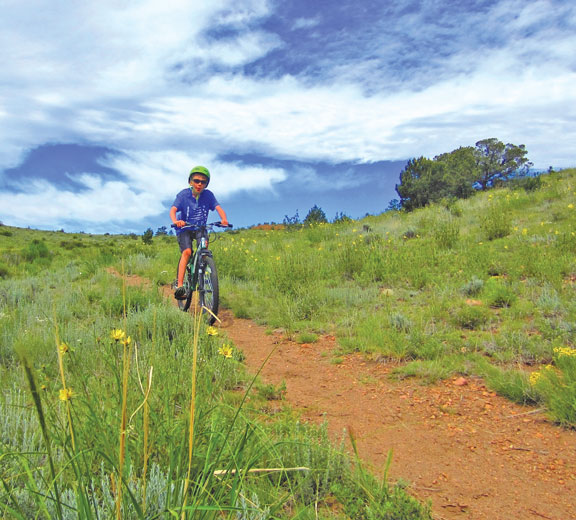By Hal Walter
I remember quite well that I was slow to learn to ride a bicycle. This may have been partially because I had not been introduced to bikes early in childhood, but for whatever reason, when I was about seven I realized other kids my age were riding and that I could not.
My mom, who was doing her best to keep the family afloat with two jobs, had acquired what was known as an “English” three-speed racing bike. It was a girls model, which meant the top rails were curved downward at an angle rather than parallel to the ground – a good thing since the bike was way too big for me.
I remember one day taking this hulking steel steed out to the sloped driveway behind the duplex where we lived, determined to learn to ride it. I started at the top with my feet to either side and shuffled along astride the bike while coasting down the short drive. Then I pushed it back up and tried again. Over and over.
Each time I was able to coast a little farther between steps. It seemed like hours went by, and then suddenly I coasted the entire driveway.
This all remained tucked away in my memory for decades but resurfaced in recent years when I began to question whether my own son would ever learn to ride a bike. It’s well known that many autistic kids have difficulty learning to balance a two-wheeler. For many there is a difficulty processing spatial relationships, motor balancing and multi-tasking skills, all of which play simultaneous roles in riding a bike.
[InContentAdTwo]We tried scooters, and small kids bikes with the training wheels removed. We used a tag-along on my mountain bike, and I even got permission to use it in the school triathlon when he was in fourth grade. However, as Harrison grew older and physically bigger the tag-along became more difficult for me to pedal, and increasingly dangerous. There were many times he leaned suddenly while we were riding along and I nearly crashed. He just did not seem to understand the consequences.
I had actually begun researching three-wheeled bikes, finding them to be quite expensive – especially the off-road models – and wondering if the investment was worthwhile long-term, or if it would only hinder the chances of him ever learning to ride what he called in the most literal of terms a “balance bike.”

At last we bought him a BMX bike. I remembered my own experience of learning to ride by straddling the bike and coasting a mild hill. We spent hours on the dirt road in front of the house with me on my bike coaching, and him straddling his BMX, going back and forth. He never was able to go more than a few feet without putting a foot down. Sometimes he would get going, and when he lost control he’d jump right off the bike and land on his feet. These sessions often ended in him throwing the bike to the ground, screaming, and stomping off in frustration.
Another summer and fall flew by and Harrison still hadn’t learned to ride. He was now nearly 11, in fifth grade, and the school triathlon was approaching again. I was already thinking about the tag-along, or maybe borrowing a three-wheeler for the event.
Then one evening he got the bike out of the garage, and I saw the look of determination that I must have had as a kid when I decided it was time to ride. Within just a few minutes he was coasting down the hill. Then he was pedaling. Within a few more minutes, he was pedaling a slight uphill.
I was stunned.
Over the next few weeks we bought him a mountain bike with gears, and he began to develop the musculature in his legs to ride much steeper hills. I would sometimes accompany him on my own bike, and then realized that I could run alongside him and even take a burro along for training. He quickly graduated from short rides to much longer jaunts. Soon he was pedaling six, seven or eight miles with ease. When the Ride the Rockies tour came to Westcliffe, we rode over to the highway and rode along with some of the cyclists. Recently he accompanied me on a nine-mile loop as I trained a burro for the pack-burro races this season.
We live near Bear Basin Ranch, where there are miles of narrow, rocky horse trails. I’d call them single-track with a heavy emphasis on the word “track,” because some of them are little more than that. One day he decided he wanted to try riding the trails.
I was prepared for the worst, figuring he would have difficulty pedaling a straight line on the single-track, and that I’d be experiencing some of the same tantrums as when he was first trying to ride on the roads. Indeed there were some moments like this, but to my amazement he took to riding these rugged trails like he’d been riding them since he was a small child.
In just a few months he’d gone from not riding a bike at all to being able to ride some fairly tricky single-track. What’s more, I quickly discovered that some of my own off-road riding skills had deteriorated over the years. So together we rode out depressions and found the lines up steep rocky pitches.
I was surprised how fast my own skills returned once I relearned how to use momentum and balance to my favor. I don’t think I’ll ever have the same fascination with mountain biking that I had, say, in my 30s, but I was grateful to have a reason to be out there on the trail reacquainting with these skills.
We hear often in this life the idiom: “It’s like riding a bike.” How often do we really think about the literalness of that phrase when we relate it to something else, like a career or love? A specific skill. For some reason you never forget how to ride a bike. Now someday, Harrison may be able to ponder that phrase as well.
Hal Walter’s book, Full Tilt Boogie – A journey into autism, fatherhood, and an epic test of man and beast is available at The Book Haven in Salida, and also from Amazon.com.




Hal, Phyllis and I were amazed at Harrison’s ability to ride his bike at the Buena Vista race yesterday, he has really become skilled and rode through very congested areas without a hitch.
He also acted quite grown up and responded to our conversations completely.
Great progress so far as we can tell.
Don